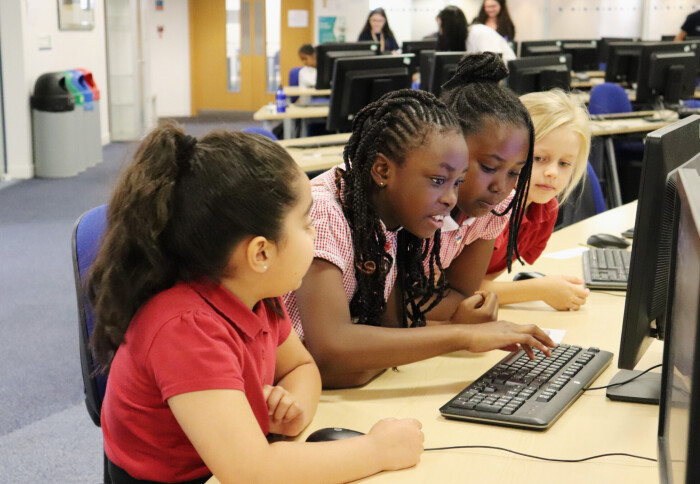Junior Hackathon inspires girls aged 7-10 in engineering, computing and maths

Imperial Computing and Mathematics Departments hosted ‘Hello World Hack’ to build confidence and remove negative stereotypes in computing and maths.
Hello World Hack, which took place on 27 June, was a team effort, with 26 staff members and students from Computing, Mathematics, Earth Science and Engineering, Brain Sciences, Physics, and the Data Science Institute volunteering their time to plan and deliver nine hands-on coding, programming and maths-based problem-solving activities.
The event, which was supported by Imperial’s Societal Engagement Seed Fund (a fund that exists to support staff who want to engage the wider public with Imperial’s work), saw 59 students from primary schools across London participate. Each activity was led and supported by scientists and mathematicians who identify as women, exposing the young girls to positive female role models across STEM.
Mathematics student Vanessa Madu, who initially came up with the idea for the hackathon, said: “My heart is just so full. The Hello World Hack started four years ago as an idea in my kitchen, and seeing it happen finally was so rewarding! The girls were so enthusiastic, willing to participate, and incredibly creative.”

“I feel so privileged to have been able to see these girls get increasingly more excited and confident as the day progressed and find out from teachers that they were talking all the way home about how fantastic the experience was and how important STEM is; I really hope that we get to do this again!" Vanessa Madu Mathematics Student and Co-Founder of Hello World Hack
Madu started the event by talking about her own research in mathematical oceanography, which turned into a running theme for the day as many students incorporated ideas about using computing and maths to help clean up the ocean in their activities - creating games using Scratch and designing apps to help tackle littering.
Madu said: “I feel so privileged to have been able to see these girls get increasingly more excited and confident as the day progressed and find out from teachers that they were talking all the way home about how fantastic the experience was and how important STEM is; I really hope that we get to do this again!
 Removing negative stereotypes
Removing negative stereotypes
Despite the inclusion of computing as a foundation subject in the national curriculum since 2014, girls are still not engaging with computer science beyond Key Stage 3 at the same level as their male peers.
Socially entrenched stereotypes of what girls can achieve and who they can become is thought to be the main reason girls are less likely to choose core STEM subjects, stereotypes that are typically fully formed by age 11.
According to Dr Jackie Bell, co-lead of the event from the Department of Computing: “Women make up only 16% of the UK’s technology workforce and only 10% of the UK’s engineering workforce. One big problem for the engagement of women in these areas is lack of exposure.”
“Girls typically aren’t exposed to coding, programming or more widely engineering until much later in their adolescent lives, and this is not helped by societal stereotypes about the roles of women. We are delighted to have received seed funding to host this event and we hope it will break down preconceptions and show girls that positive female role models in mathematics, computing and engineering exist.”
 Inspiring young minds
Inspiring young minds
There was great feedback from students, parents and teachers following the event, with one school governor remarking: "The girls spoke at length all the way back to school and the following day about the trip. This was a very different experience for them and the exposure to STEM activities was much needed. The day ... has the girls yearning for more STEM activities, so it is already having a positive influence and impact.”
A parent of one girl noted how “impressed [he was]” when his daughter “came back stressing the importance of Maths in Computing and also the more social/artistic aspects.”
A teacher told us that the “children absolutely loved the experience. Some said it was the best day ever!” and another commented that they already have girls asking if they can join next year should it become a regular event.
Article text (excluding photos or graphics) © Imperial College London.
Photos and graphics subject to third party copyright used with permission or © Imperial College London.
Reporter
Nisha Emich
Office of the Provost
Gemma Ralton
Faculty of Engineering